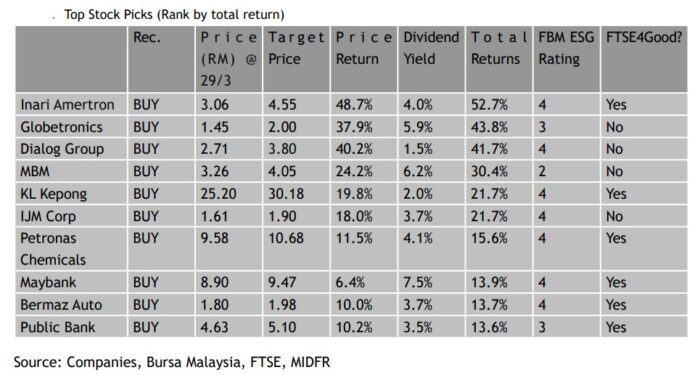IF there is one positive outcome from 1Q 2022 that has benefitted Bursa Malaysia thee most, it has to be that as of March 31 (yesterday), the local bourse had raked in a net inflow of RM6.46 bil from foreign investors. In fact, out of the 61 trading days, there have been 52 days of net inflows.
Whether this will trend will persist going into 2Q 2022 and beyond is as good as anybody’s guess but MIDF Research is closely monitoring these five factors that it deemed will affect the Malaysian stock market for the rest of the year:
US interest rates movement: Expect more intermittent knee-jerk market price movements in reaction to the US Federal Reserve on-going communications pertaining to its future course of monetary actions.
Nevertheless, bear in mind that the mid-to-secular price trajectory of the FBM KLCI would likely correspond to the underlying earnings performance of its constituents amid the sporadic bouts of volatility.
The research house is forecasting Malaysia’s gross domestic product (GDP) growth to strengthen to 6.0% (official: 5.5-6.5%) in 2022. Along with the expectation of continued macro recovery, the market consensus is forecasting the FBM KLCI to register +0.3% year-on-year (yoy) earnings growth this year and +6.8% yoy in 2023.
Going forward, as we expect the local equities valuation (to remain relatively depressed albeit) inching closer towards its historical range, thus we maintain our FBM KLCI end-2022 target at 1,700 points or price-to-earnings (PER) of 15.8 times.
Waning of COVID-19: Going forward, the opening of international borders effective April 1 and further upliftment to the remaining COVID-19 requirements/restrictions would result in heightened pace of economic recovery which would eventually be mirrored in better performance of the equity market.
The Russia-Ukraine war: The ongoing Russia-Ukraine war is not foreseen to spread to other countries in the region. Moreover, despite the heavy financial and trade sanctions imposed on Russia by the US, the European Union and some of their allies, the economic blow-backs are expected to vary from country to country depending on the level of their bilateral trades as well as the ability to re-channel trades.
At this juncture, the conflict would not materially derail Malaysia’s economic recovery narrative and likewise the direction of the local equity market.
China economic outlook: From being a key driver, China’s property sector is now seen as a weak link to its economic growth with home sales dropping 22% in the first two months of 2022 from a year earlier, according to data from the country’s National Bureau of Statistics.
Going forward, the world’s equity market may continue to be beset by intermittent worries over contagion risk of further weakness in China property market.
Nonetheless, we believe the authorities in China would stand ready to continue to inject the necessary amount of liquidity (ie pull out all the monetary and fiscal stops) to avoid a systemic fall-out thus limiting the risk of cross-sectoral as well as cross-border contagion.
15th General Election (GE15): In the aftermath of consecutive state election victories by the Barisan Nasional (BN) and its allies last year and early this year, there is a fair likelihood that the country may be heading to the national polls in 2H 2022.
Outwardly, the recent state elections in Melaka, Sarawak and Johor are pointing towards a more stable majority government post-GE15. Nonetheless, the situation at national level is more complex and fluid according to some political watchers.
However, either way, MIDF Research expects the impact of upcoming GE15 on the equity market to be either neutral or positive. – April 1, 2022










